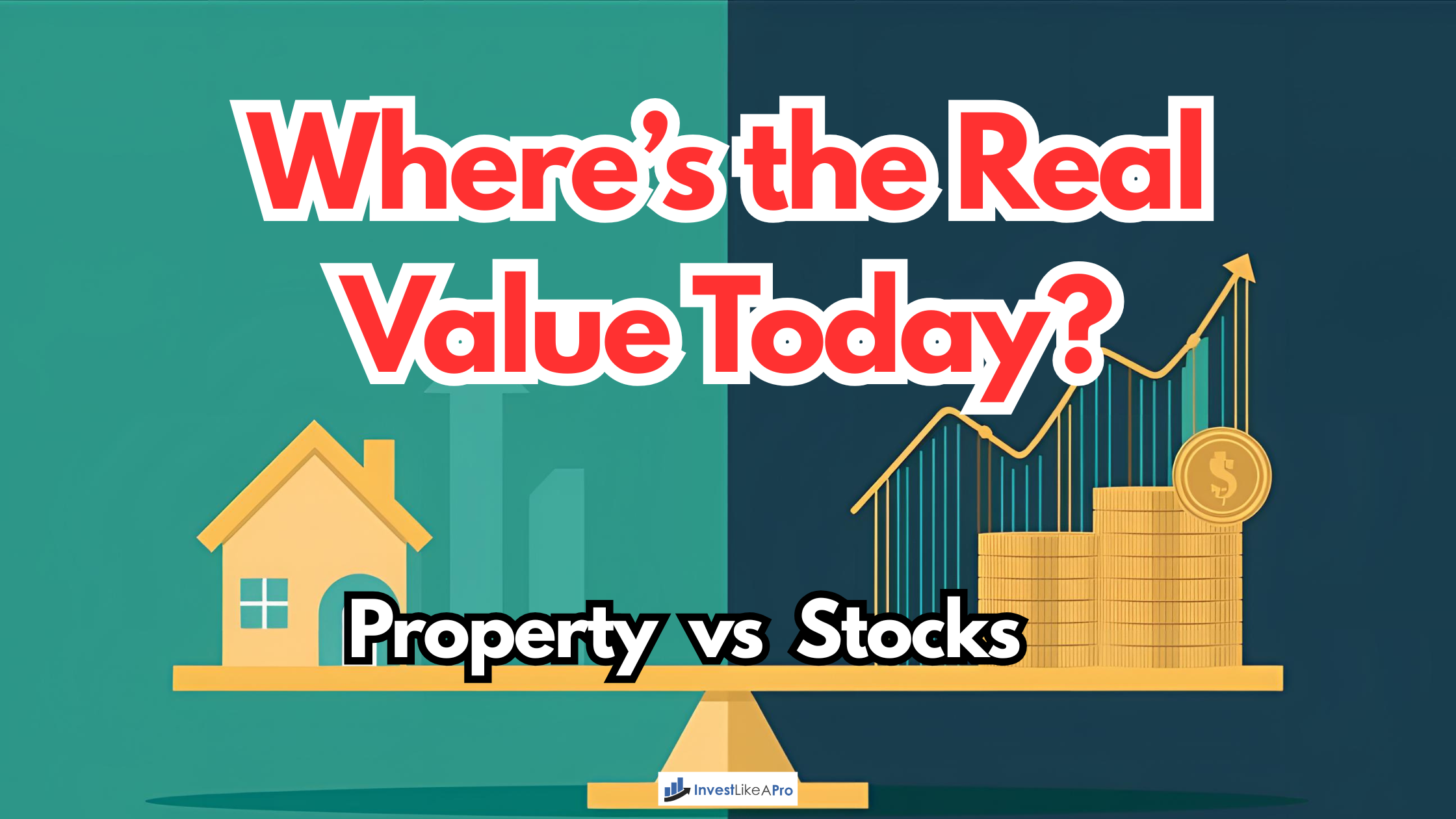Property as Your Pension? + Searching for Value ….
Written by a human (me), not Ai.
Property and stocks are two asset classes that people usually consider investing in. They tend to dominate asset allocation in our portfolios.
Many coming into our Investment Academy are property investors looking to add, or enhance, stocks and other passive assets for better diversified portfolios.
Btw: For more insights like this – straight to your inbox – leave your details in the box at top of this page ☝🏼
Property v Stocks – Which Should You Own?
I’m often asked this question and my standard answer was usually both. My personal portfolio mix reflects this: property is approx 40% with financial assets at 55%.
But I haven’t made additional property investments since 2021. So in the last 4 years my incremental allocation to property was 0%.
What are my concerns with Property?
Property is not the same asset class it once was. The last few years has seen:
- Penalising tax changes for landlords
- Higher interest rates
- Reduced cash flow
- Increased regulation
- Renters’ Rights Bill (to come)
These have combined to damage overall sentiment in the asset class and created 3 major concerns for me:
1. Where’s the Value?
When sentiment impacts stocks, prices adjust until value emerges. And stocks always bounce back – often swiftly and significantly. Think: Covid or the Trump tariff wobble.
But Property hasn’t offered value in the same way. Despite the poor sentiment, finding bargains has not been easy.
Dedicated property professionals might uncover pockets of value but it’s a difficult task for a regular investor.
And despite the poor sentiment UK, property prices have been rising (latest: +2.2% pa) and are at record highs, according to the Halifax house price index.
Consequently, yields are not showing much value. According to Zoopla, the UK average gross yield for a buy-to-let sits at 5.8%.
That’s a gross yield, of course. Subtracting mortgage interest, maintenance, management, voids, insurance and taxes leave very little in net cashflow return.
2. Property as your Pension?
For most people, their pension is the biggest source of assets and income to support retirement.
That means it’s critical for your pension to be well diversified.
We’ve seen numerous big changes to the property market (listed above). All those only emerged in the last 8 years.
Given the direction of travel on policy and tax for landlords, who knows what the next 8 years will bring.
So, owning just one asset class as a pension is a pretty risky strategy. Better diversification will be critical, going forward.
The ideal investments for a pension should tick the following boxes:
- Growth at above-inflation rates
- Capable of income generation for retirement needs
- Passive and liquid
- Tax Efficient: Creating an instant uplift upon contribution to your pension and tax-free growth and income without tax liability.
Btw, Residential property is anti #4 – incurring stamp duty on purchase, tax on rents, tax on personal income extraction, and capital gains tax.
To be clear, owning stocks alone is also not advisable.
That’s why we help investors create a diversified financial assets portfolio which also includes Gold, Options, REITs, Bonds, High Dividends, as well as regular stocks/ETFs.
3. Tenants, Toilets and Boilers …
As i have got busier and older, my appetite to deal with property management has fast declined!
With regulations and stress expected to increase (eg Renters’ Rights Bill) I’m mindful of wanting to make life easier, not harder.
Would I buy property in the future?
Absolutely – if an opportunity with clear value-add potential came along.
Finding such opportunities has become a lot harder in recent years, particularly for part-time investors like myself.
In the meantime I remain in passive financial markets where I can be diversified across multiple asset classes like Stocks, Gold, Bonds, and Options – with the ability to earn attractive levels of income in a risk-controlled way
Always Remember:
- Time in the Markets always beats timing the markets
- Stay Diversified
- Minimise those leakages: Fees, Inflation, and Taxes
- Financial Markets are a great source of recurring income
- ETFs, Balanced Funds and Options achieve all the above
- Being educated helps you outperform 99% of the population
… to ensure your investments work for YOUR financial freedom (not someone else’s)
And …
For more guidance, our Investment Academy will help you implement all of this in a step-by-step way.
Thousands of people have learnt how to diversify and pound-cost-average into low-cost, set-and-forget ETFs & Funds for inflation-beating growth. And Options to create recurring income.
Click here to learn about our Investment Academy
Finally …
– Don’t take the above as advice as it may not apply to you personally
– Your Capital is at Risk
– You may not be covered by the FSCS
– Anything mentioned in a podcast or in a previous article was valid at that time and may not continue to be now







